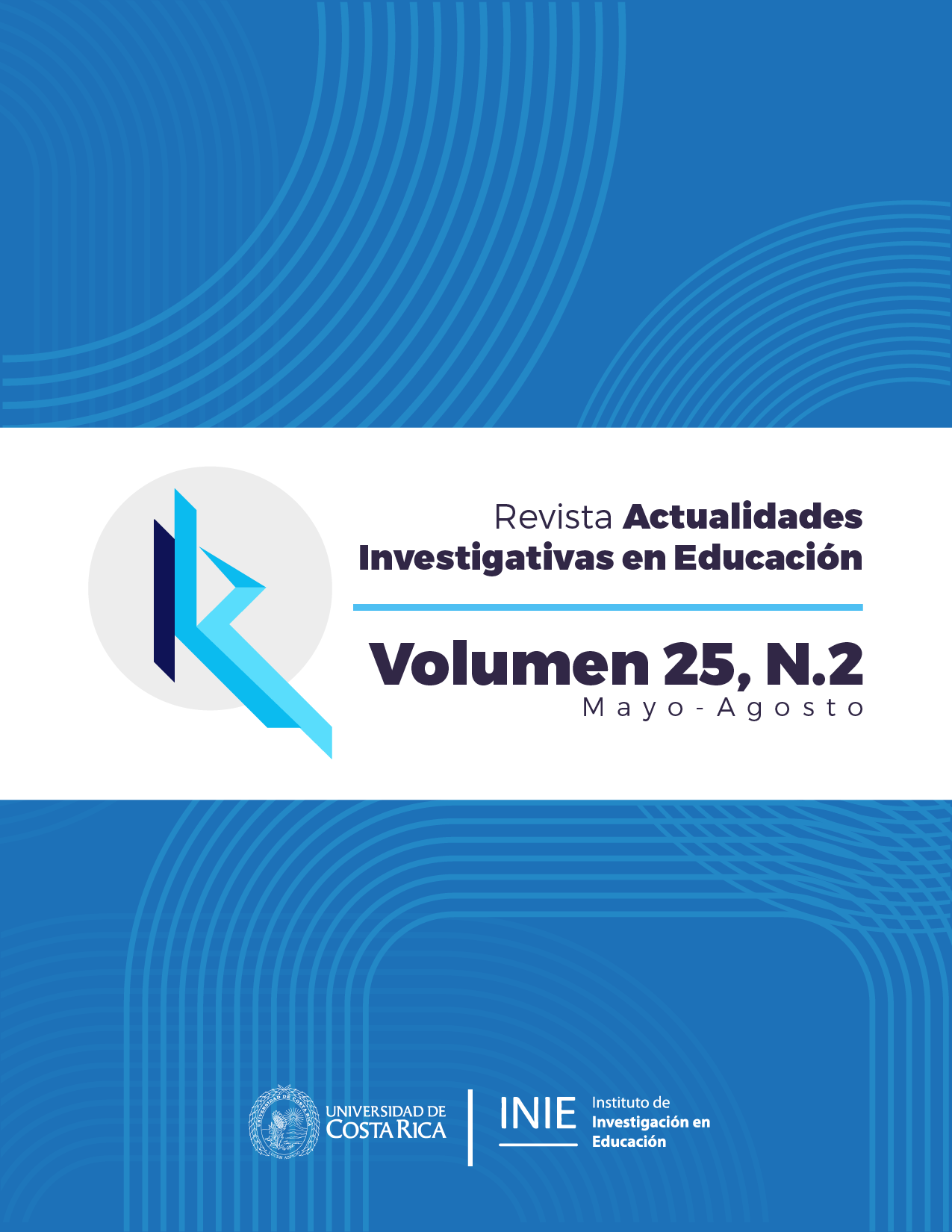Abstract
This research analyzes the application of theoretical lines focused on science education and social justice to develop critical awareness through pedagogical metacognition processes among pre-service teachers in the Natural Sciences Teaching program at the University of Costa Rica. The problem refers to the barriers in the incorporation of aspects of social justice in scientific education, as well as a pedagogical representation disconnected from the world, which results in a lack of interest on the part of students, especially those who, due to gender issues, cultural diversity or social stratum, perceive science as something alien to their reality.Therefore, an educational intervention was carried out from August 2021 to July 2022 with 17 pre-service teachers; the study is longitudinal and qualitative. Data was collected through questionnaires, review of teaching units, focus groups, and observations. Through the educational intervention, it was observed that exposure to the theories of transformative socioconstructivism, critical transculturalism, and the STEAM educational approach improved the understanding of complex sociocultural aspects, such as gender equity, cultural diversity, and the recognition of one's own positionalities as teachers. This promotes interdisciplinarity through contextualized scientific education that considers political, economic, social, and cultural aspects from a social justice perspective.
References
Archer, Louis., Calabrese Barton, Angela., Dawson, Emily., Godec, Spela., Mau, Ada., y Patel, Uma. (2022). Fun moments or consequential experiences? A model for conceptualising and researching equitable youth outcomes from informal STEM learning. Cultural Studies of Science Education, 17, 405–438. https://doi.org/10.1007/s11422-021-10065-5
Binkley, Marilyn., Erstad, Ola., Herman, Joan., Raizen, Senta., Ripley, Martin., Miller-Ricci, May., Rumble, Mike. (2012). Defining Twenty-First Century Skills. En Patrick Griffin y Esther Care (Eds.), Assessment and teaching of 21st century skills: Methods and approach (pp. 17-66). https://doi.org/10.1007/978-94-017-9395-7
Carlone, Heidi., y Johnson, Angela. (2007). Understanding the Science Experiences of Succesful Women of Color: Science Identity as an Analytic Lens. Journal of Research in Science Teaching, 44(8), 1187–1218. https://doi.org/10.1002/tea.20237
Çolakoğlu, Jasmine., Steegh, Aneke., y Parchmann, Ilka. (2023). Reimagining informal STEM learning opportunities to foster STEM identity development in underserved learners. Frontiers in Education, 8, 1–16. https://doi.org/10.3389/feduc.2023.1082747
Costanza-Chock, Sasha. (2020). Design justice: Community-led practices to build the worlds we need. The MIT Press.
El-Mafaalani, Alladin. (2021). Mythos Bildung (2nd ed.). Kiepenheuer & Witsch (KiWi).
Escobar, Arturo. (2017). Designs for the Pluriverse: Radical Interdependence, Autonomy, and the Making of Worlds. Duke University Press. http://www.jstor.org/stable/j.ctv11smgs6
European Institute for Gender Equality. (2023). Gender Equality Index 2023: Towards a green transition in transport and energy. https://eige.europa.eu/publications-resources/publications/gender-equality-index-2023-towards-green-transition-transport-and-energy?language_content_entity=en
Freire, Paulo. (1970). Pedagogy of the Oppressed. Penguin Random House UK.
Gago, Verónica. (2019). La potencia feminista. O el deseo de cambiarlo todo. Traficantes de Sueños. https://traficantes.net/sites/default/files/pdfs/TDS_map55_La%20potencia%20feminista_web.pdf
Galagovsky, Lidia. (2010). Didáctica de las ciencias naturales. El caso de los modelos científicos.
Hooks, Bell. (1994). Teaching to Transgress—Education as the Practice of Freedom. Routledge. https://doi.org/10.4324/9780203700280
Hooks, Bell. (2003). Teaching Community—A Pedagogy of Hope. Routledge. https://doi.org/10.4324/9780203957769
Hooks, Bell. (2009). Teaching Critical Thinking—Practical Wisdom. Routledge. https://doi.org/10.4324/9780203869192
Kayumova, Shakhnosa., y Dou, Remy. (2022). Equity and justice in science education: Toward a pluriverse of multiple identities and onto‐epistemologies. Science Education, 106(5), 1097–1117. https://doi.org/10.1002/sce.21750
Kumar, Revathy., y Lauermann, Fani. (2018). Cultural Beliefs and Instructional Intentions: Do Experiencies in Teacher Education Institutions Matter. American Educational Research Journal, 55(3), 419-452. https://doi.org/10.3102/0002831217738508
Ministerio de Ciencia Tecnología y Telecomunicaciones. (2017). Política Nacional para la igualdad entre mujeres y hombres en la formación, el empleo y el disfrute de los productos de la ciencia y la Tecnología, las Telecomunicaciones y la innovación 2018-2027. http://10.1.0.234:8080/handle/123456789/92
Ministerio de Educación Pública. (2016). Educar para una Nueva Ciudadanía. Programa de Estudio de ciencias. Tercer ciclo de Educación General Básica.
May, Stephen., y Sleeter, Christine E. (2010). Critical multiculturalism: Theory and praxis. Routledge
Moje, Elizabeth B., Collazo, Tehani., Carrillo, Rosario., y Marx, Ronald W. (2001). “Maestro, what is ‘quality’?”: Language, literacy, and discourse in project-based science. JRST, 38(4), 469-498. https://doi.org/10.1002/tea.1014
Ozturk, Nesrin. (2024). Revisiting Flavell’s Theory of Metacognition for Metacognitive Responsiveness. Kuramsal eğitimbilim dergisi, 17(2), 257–271. http://dx.doi.org/10.30831/akukeg.1232284
Polino, Carmelo. (2012). Las ciencias en el aula y el interés por las carreras científico-tecnológicas: un análisis de las expectativas de los alumnos de nivel secundario en Iberoamérica. Revista Iberoamericana de Educación, 58, 167-191. https://doi.org/10.35362/rie580479
Rodríguez, Alberto., y Navarro-Camacho, Marianela. (2021). Exposing the invisibility of marginalizad groups in Costa Rica and promoting Pre Service- Teachers´ Critical Positional Practice. In Alberto J. Rodríguez y Regina L. Suriel (Eds.), Equity in STEM Education Research (pp. 125-146). Springer Nature. https://doi.org/10.1007/978-3-031-08150-7_7
Rodríguez, Alberto J. (2011/1998). Strategies for counterresistance: Toward sociotransformative constructivism and learning to teach science for diversity and for understanding. Journal of Research in Science Teaching. (Re-pinted in the 2011 Special issue on multicultural science education, equity and social justice). http://dx.doi.org/10.1002/(SICI)1098-2736(199808)35:6%3C589::AID-TEA2%3E3.0.CO;2-I
Rodriguez, Alberto J. (2015). Managing institutional Sociocultural and Institutional Challenges through Sociotransformative Constructivism: A Longitudinal Case Study of a High School Science Teacher. Journal of Research in Science Teaching, 52(4), 448–460. https://doi.org/10.1002/tea.21207
Sanders, Marck. (2008). STEM education. The Technology Teacher, 68(4), 20-26. https://vtechworks.lib.vt.edu/handle/10919/51616
Sanders, Marck E. (2010). Integrative STEM education. http://web.archive.org/web/20110807171941/http://www.soe.vt.edu/istemed/index.html
Schön, Donald A. (1992) La Formación de Profesionales Reflexivos: Hacia Un Nuevo Diseño de la Enseñanza y el Aprendizaje en Las Profesiones. Paidós.
Snow, Charles Percy. (1995). As duas culturas. A uma segunda leitura. Editora da Universidade de São Palo.
Swartz, Robert., y Perkins, David. (1990). Teaching Thinking: Issues and Approaches. Routledge. https://www.routledge.com/Teaching-Thinking-Issues-and-Approaches/Hobson-Perkins/p/book/9781138648432?srsltid=AfmBOooHYpJKOZJR55sCwmSZXZga5_IYOzaOVsm2nLg-Gj0Iy50IHEFy
##plugins.facebook.comentarios##

This work is licensed under a Creative Commons Attribution-NonCommercial-ShareAlike 4.0 International License.
Copyright (c) 2025 Marianela Navarro Camacho, Calos Luis Mena León, Adrian Grimm







